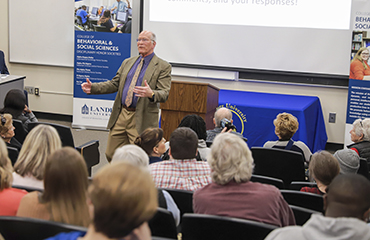
The murder of six million Jews by the Nazis during World War II was “the quintessence of evil,” according to Dr. Clifford Cain.
Jews, however, were not the only victims. Disabled people, gay people, Slavic people, dissident priests, Jehovah’s Witnesses, communists and protesters of all kinds were killed, too. “A recent estimate puts the number of dead at 11.5 million,” Cain said.
Cain, Harrod-C.S. Lewis Professor of Religious Studies Emeritus at Westminster College of Missouri, spoke at Lander University on Thursday, Jan. 26, to mark Holocaust Remembrance Day, observed on Jan. 27.
He said that Adolf Hitler, who rose to power following Germany’s defeat in World War I, “needed to blame someone for everything that was wrong with Germany. Hitler did not invent anti-semitism, that is, the hatred of Jews. He simply tapped it for his purposes.”
Jews were barred from professions such as banking, the medical and legal fields, and teaching on the university level. They had to turn in their radios. They were not allowed to drive cars or use public transportation. Their shopping was limited to two hours a day, and they had to be off the streets by 8 p.m.
Before long, Jews were being “rounded up and arrested. Jews had to wear identification tags – a yellow star. Jews were consolidated in ghettos, separated from the rest of society,” Cain said.
The “final solution” to the Jewish “problem” was to send Jews to concentration camps, like Dachau near Munich, where they were “worked to death,” or to extermination camps, like Auschwitz in Poland, where they were “regularly murdered.”
According to Cain, “resistance to Hitler was minimal.” The church and the universities in the country were largely compliant. Hitler was regarded as “the new Messiah, who would lead Germany back to greatness.”
The Jewish Holocaust may be painful to remember, said Cain, but it’s important to do so, just the same. He quoted the philosopher George Santayana, who said that “those who cannot remember the past are condemned to repeat it.”
Cain said, “we may not be able to guarantee no future holocaust, no repetition of the past, but we can guarantee that we will not be quiet, and we will not be complicit, in the face of injustice and evil.”